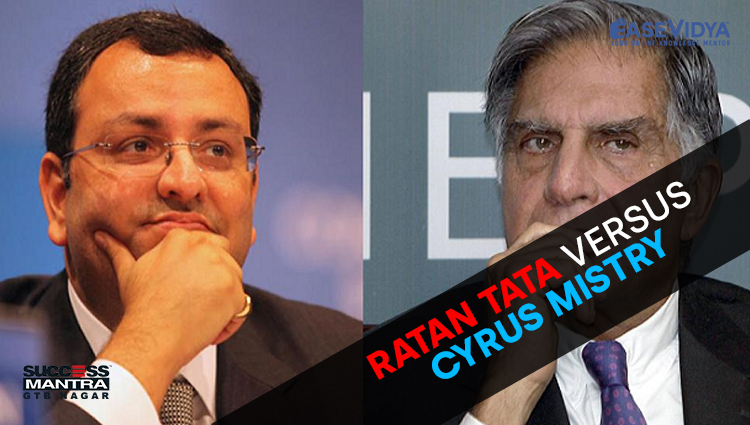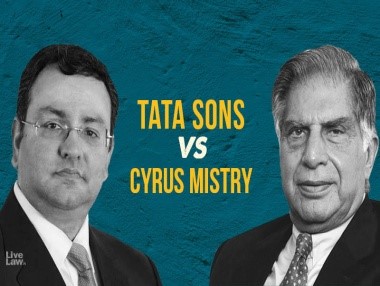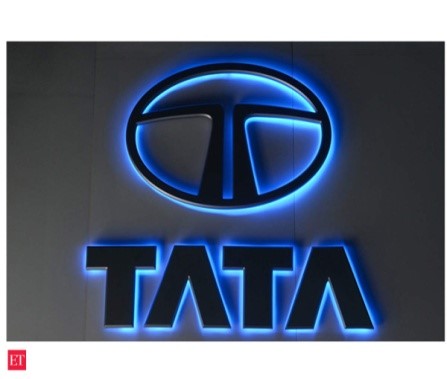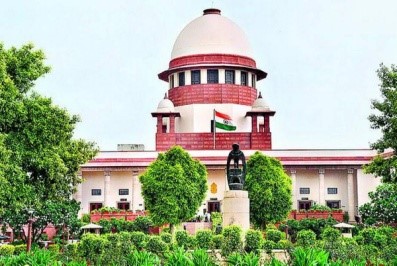
RATAN TATA VERSUS CYRUS MISTRY
RATAN TATA VERSUS CYRUS MISTRY

Cyrus Mistry’s family Shapoorji Pallonji (SP) owns 18.46% equity capital in Tata Sons, the main holding company of Tata Group. 66% of Tata Sons is owned by Tata Trusts, currently controlled by Ratan Tata, the group’s former Chairman.
TIMELINE OF THE CONTROVERSY
- December 2012–Appointment of Mistry: Cyrus Mistry is appointed Chairperson of Tata Sons Limited.
- October 2016- Removal of Mistry: He is sacked
- from the post of Executive Chairperson by most of the Board of Directors.
- February 2017– Case filed against Tata Sons: The shareholders vote for Mistry’s removal from the board of Tata Sons during an extraordinary general meeting. Mistry, subsequently, files a suit under various sections of the Companies Act, 2013, alleging oppression and mismanagement in Tata Sons.
- July 2018- Tatas win in NLCT: The Mumbai Bench of the National Company Law Tribunal (NCLT) dismisses Mistry’s plea against Tata Sons. While rejecting his allegations, NCLT rules that the Board of Directors are competent enough to remove him as Chairman. The tribunal also states that it found no merit in the arguments on mismanagement in Tata Sons.
- December 2019– Tatas lose in NCLAT: The National Company Law Appellate Tribunal (NCLAT) overturns the NCLT judgment, and states that Mistry’s removal as Chairman of Tata Sons was illegal.
NCLAT also found that the affairs of Tata Sons were conducted in a manner prejudicial and oppressive to its minority shareholders, namely Cyrus Mistry & his family companies, as well as to the interests of the company itself. January 2020- Appeal to SC: Tata Sons and Ratan Tata challenge the NCLAT decision before the Supreme Court saying that the NCLAT verdict undermined Corporate Democracy and the rights of its Board of Directors.
Subsequently, the Supreme Court stays the NCLAT judgment to reinstate Mistry as the executive chairman of Tata Sons. September 2020: The Supreme Court restrains Mistry’s Shapoorji Pallonji Group from pledging its shares in Tata Sons to raise funds.
March 2021: Final Verdict on the case
ALLEGATIONS & CONCERNS RAISED BY MISTRY

Rights of Minority Shareholder’s oppressed: SP Group had also alleged that Tata Sons was being run and operated in a manner which was “oppressive” and “prejudicial” to the rights of minority shareholders. It was alleged that the removal of Cyrus Mistry meant oppression of minority shareholders. Article 75 of the Articles of Association of the Tata Group. Article 75 gives the company the right to purchase shares from a minority or a small shareholder at a fair market value. Fearing that the Tata Group may use it to try and buyout the SP Group, the latter urged the company law tribunals and the Supreme Court to not allow Article 75 to be used.
Decisions disproportionately impacted minority shareholders: Apart from this, the Mistry camp had also alleged that the Tata Group had taken several commercial decisions which did not yield the desired result and thus resulted in more loss for the minority shareholders than the majority shareholders.
DECISION OF THE SUPREME COURT
No Entitlement to seat on Board: Discussing the rights of minority and small shareholders and their importance in the board of a company, the Supreme Court held that minority shareholders or their representatives are not automatically entitled to a seat on the private company’s board like a small shareholder’s representative. This meant that SC set aside NCLAT order and dismissed the appeals of Mistry & SP Group.
Small Vs Minority Shareholder: SC noted that the provisions contained in the 2013 Companies Act only protects the rights of small shareholders of listed companies by asking such companies to have on their board at least one director elected by such small shareholders. Small shareholders, according to the Companies Act, is a shareholder or group of shareholders who hold shares of nominal value of not more than Rs 20,000. Since the Mistry family and the SP Group were not “small” shareholders, but “minority shareholders”, there was no statutory provision which gave them the “right to claim proportionate representation,” on the board of Tata Sons.
No Right to Proportionate Representation: SC noted that the right to claim proportionate representation is not available for the SP Group even contractually, in terms of the Articles of Association. Neither SP Group nor CPM (Cyrus Pallonji Mistry) can request the Tribunal (NCLAT) to rewrite the contract, by seeking an amendment of the Articles of Association. The Articles of Association, as they exist today, are binding upon SP Group and CPM.
IMPACT OF THE JUDGEMENT

The Supreme Court has not negated the concept of quasi-partnership or a contractual agreement. Though the judgment does not directly impact the right of minority shareholders, it does mean that going ahead, such shareholders will have to ensure that they have a contract with the majority shareholders or the promoters of the company to ensure they have adequate representation on the board.
NATIONAL COMPANY LAW APPELLATE TRIBUNAL
The NCLAT was constituted under Section 410 of the Companies Act, 2013 to hear appeals against the orders of the National Company Law Tribunal (NCLT). NCLT is a quasi-judicial body that adjudicates issues relating to companies. It is also the appellate tribunal for orders passed by the NCLT(s) under Section 61 of the Insolvency and Bankruptcy Code (IBC), 2016, and for orders passed by the Insolvency and Bankruptcy Board of India (IBBI) under Sections 202 and 211 of the IBC. Any person aggrieved by any order of the NCLAT may file an appeal to the Supreme Court. NCLAT is also the Appellate Tribunal to hear and dispose of appeals against any direction issued or decision made or order passed by the Competition Commission of India (CCI).
TEST YOURSELF
Q.1 Which of the following posts were held by Cyrus Mistry in Tata Group which is in controversy with Ratan Tata, who is current Chairman of TATA trusts?
- Chief Financial Officer
- Chairman & Chief Executive Officer of TATA Group: ANSWER
- Managing Director
- None of the above
Q.2 Minority holders are the equity holders of a firm who do not enjoy the voting power of the firm by virtue of his or her below __________ of the firm’s equity capital?
- 50% ownership: ANSWER
- 27% ownership
- 18% ownership
- None of the above
Q.3 Cyrus Mistry who alleges oppression and mismanagement in Tata Sons & subsequently, files a suit under various sections of which of the following Acts?
- Indian Partnership Act, 1932.
- Limited Liability Partnership Act, 2008.
- Companies Act, 2013: ANSWER
- Companies Act, 2011
Q.4 The National Company Law Appellate tribunal was constituted under which of the following sections of the Companies Act?
- Section 310
- Section 410: ANSWER
- Section 429
- Section 420
Q.5 NCLAT is the Appellate Tribunal to hear and dispose of appeals against any direction issued or decision made or order passed by which of the following?
- Competition Commission of India (CCI)
- Telecom Regulatory Authority of India (TRAI)
- Insolvency and Bankruptcy Board of India (IBBI)
- I & II follows
- II & III follows
- I & III follows: ANSWER
- None of the above












bbvefwkw
RATAN TATA VERSUS CYRUS MISTRY | cyrus mistry | tata group chairman | pallonji mistry | noel tata | daily article | monthly article | weekly article | yearly article | most requesting articles | legal awareness articles | current affairs | passage based current affairs | one linear current affairs | current affairs for CLAT | current affairs for AILET | current affairs for slat | legal aptitude current affairs | law current affairs | current event | current affairs pdf | current affairs pdf in English | current affairs pdf free download | current affairs MCQ | current affairs MCQS | current affairs work sheet | current affairs UPSC | current affairs BBA | current affairs BCA | current affairs BJMC | current affairs NCHMJEE | daily editorial | monthly editorial | weekly editorial | yearly editorial | most asking editorials | legal awareness editorials | current editorial | passage based current editorial | one linear current editorial | current editorial for CLAT | current editorial for AILET | current editorial for slat | legal aptitude current editorial | law current editorial | current event | current editorial pdf | current editorial pdf in ENGLISH | current editorial pdf free download | current editorial MCQ | current editorial MCQS | current editorial work sheet | current editorial UPSC | current editorial BBA | current editorial BCA | current editorial BJMC | current editorial NCHMJEE | latest news in India | latest news in Hindi | latest news Delhi | latest news today India | latest news live | 3 latest news | latest news today Delhi | latest news Aajtak | news articles India | news articles for students | news articles 2020 | news articles in English | news articles in Hindi | news article example | short news articles | news article meaning | success mantra Delhi | CLAT coaching in Delhi | best CLAT du LLB institute in Delhi | read daily article editorials only on success mantra blog [url=http://www.g1gcg77qc3bx1kiqd79340tb92959d4zs.org/]ubbvefwkw[/url] bbvefwkw http://www.g1gcg77qc3bx1kiqd79340tb92959d4zs.org/ <a href="http://www.g1gcg77qc3bx1kiqd79340tb92959d4zs.org/">abbvefwkw</a>
qschjrggxc
Latest News on Education & LAW Exams Blogs | Success Mantra qschjrggxc http://www.gc82f0672011oc3a2wmrk0rb5i28j2ups.org/ [url=http://www.gc82f0672011oc3a2wmrk0rb5i28j2ups.org/]uqschjrggxc[/url] <a href="http://www.gc82f0672011oc3a2wmrk0rb5i28j2ups.org/">aqschjrggxc</a>
https://evolution.org.ua/
I read this piece of wwriting fully about the comparison of most up-to-date and previous technologies, it's awesome article. https://evolution.org.ua/
dwmppdirtn
Latest News on Education & LAW Exams Blogs | Success Mantra [url=http://www.gb0a5u97935des2bk4ah14dnv87y068xs.org/]udwmppdirtn[/url] dwmppdirtn http://www.gb0a5u97935des2bk4ah14dnv87y068xs.org/ <a href="http://www.gb0a5u97935des2bk4ah14dnv87y068xs.org/">adwmppdirtn</a>